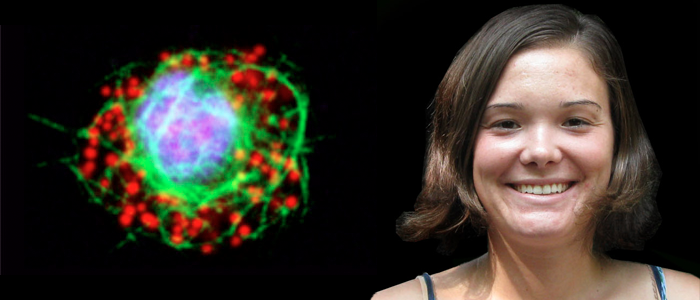Molecular, Cell, and Developmental Biology (MCD)
COURSES AND REQUIREMENTS
The graduate training track in Molecular, Cell, and Developmental Biology provides intensive training in the skills necessary to begin outstanding research and teaching careers in modern biology. The goal of the program is to produce graduates with both a broad foundation in molecular, cellular, and developmental biology, as well as in-depth knowledge and skills in the specific area of their thesis research. New trainees undertake rigorous core coursework that emphasizes critical evaluation of scientific models and experimental results. New trainees also participate in three seven-week laboratory rotations and at the end of the first year initiate independent research, which ultimately leads to a dissertation. Second-year students take an oral qualifying exam. Graduate students work under the direct supervision of one of thirty-eight affiliated faculty members in a highly interactive, collaborative research environment. All students participate in a variety of seminars, advanced special topics courses, and research group meetings designed to provide
General Requirements
- Coursework: Students take 9 courses – 7 core courses and 2 electives (courses listed below)
- Research Rotations: Students complete 3 rotations in different laboratories during the 1st year
- Rotation Seminar: Students present a talk at the end of each rotation in the 1st year.
- Teaching: Students must fulfill no less
than 2 TAships in their graduate career. - Oral Qualifying Exam: Exam is taken at the end of the 2nd year.
- Research Seminar: Students formally present their research at the end of the 3rd year.
- Thesis Advisory Committee: Students must meet with their Thesis Advisory Committee at least once a year.
- Doctoral Dissertation: Students must submit a doctoral thesis to their Thesis Advisory Committee.
- Oral Dissertation
Defense : Students must present a formal departmental seminar on their thesis research.
Required Course Work
Required Core Courses:
|
BIOL 200A |
Critical Analysis of Scientific Literature |
|
BIOL 200E |
Experimental Design |
|
BIOL 200F |
Logic and Approaches to Scientific Discovery |
|
BIOL 215 |
Applied Statistics for Molecular, Cell, and Developmental Biology |
|
BIOL 288 |
Pedagogy in STEM |
|
BIOL 289 |
Practice of Science |
|
BIOL 230 |
Grant Writing (Year 2) |
Elective Courses:
|
Approved Graduate Electives List |
|
|
Content-Based Electives |
|
|
BIOL 201 |
RNA Processing |
|
BIOL 205 |
Epigenetics |
|
BIOL 206 |
Introduction to Stem Cell Biology |
|
BIOL 217 |
Influence of Environment and Experience on Brain Development |
|
BIOL 218 |
CRISPR/Cas Technologies |
|
BIOL 226 |
Advanced Neuroscience |
|
BIOL 228 |
Developmental Neurobiology |
|
BME 110 |
Computational Biology Tools |
|
BME 130 |
Genomes |
|
BME 160 |
Research Programming in the Life Sciences |
|
BME 163/263 |
Applied Analysis and Visualization of Scientific Data |
|
BME 205 |
Bioinformatics: Models and Algorithms |
|
BME 229 |
Protein and Cell Engineering |
|
BME 230A |
Intro to Computational Genomics (Prereq: BME 205) |
|
BME 230B |
Advanced Computational Genomics (Prereqs: BME 205, BME 230A) |
|
BME 237 |
Applied RNA Bioinformatics |
|
BME 263 |
Applied Visualization and Analysis of Scientific Data |
|
BME 272 |
Precision Medicine |
| BME 273 |
Stem Cell Epi/Genomics |
|
BME 278 |
Stem Cell Biology |
|
CHEM 200A |
Advanced Biochem: Biophysical Methods |
|
CHEM 200B |
Advanced Biochem: Protein Structure and Function |
|
CHEM 200C or CHEM 271 |
CHEM 200C: Advanced Biochem: Structure and Function of Nucleic Acids CHEM 271 Chemical Biology (with instructor permission) |
|
ECE 236 ² |
Special Topics in Electrical Engineering "Optics and Microscopy" |
|
ECE 237 ² |
Image Process and Reconstruction |
|
METX 202 |
Cellular and Molecular Toxicology |
|
METX 206A |
Advanced Microbiology |
|
METX 210 |
Bacterial Pathogenesis |
|
METX 238 |
Pathogenesis: Molecular Mechanisms of Disease |
|
STAT 108 ¹ |
Linear Regression |
|
STAT 205B ¹ |
Intermediate Classical Interference |
|
STAT 208 ¹ |
Linear Statistical Models |
|
STAT 266A ¹ |
Data Visualization and Statistical Programming in R |
|
Skills-Based Electives (Students may only count 1 of the following courses towards their graduate electives) |
|
|
BIOL 220 |
STEM Outreach |
|
BIOL 247 |
Stem Cell Research: Scientific, Ethical, Social, and Legal Issues |
|
BIOL 290 |
Career Planning |
|
BME 275 |
Entrepreneurship in Biotechnology |
|
PDP |
Training in teaching offered by the Institute for Scientist and Engineer Educators (ISEE) |
|
¹ Students who have had no or very little Statistics should audit or take STAT 7 (5 credits) and perhaps also STAT 7L (2 credits) to learn the basics, before taking one of the graduate level courses. |
|
|
² Students may count either ECE 236 or ECE 237, but not both, toward their advanced graduate electives. |
|
|
³ Biol 215, Chem 230, and Biol 230 may only count as electives to PhD students who matriculated prior to fall 2020. |
|
Detailed descriptions of courses and other requirements can be reviewed in the 2023-24 MCDB Graduate Handbook below:
Graduate students who matriculated Fall 2023 may consult the 2023-2024 Graduate Handbook here.
Graduate students who matriculated Fall 2022 may consult the 2022-2023 Graduate Handbook here.
Graduate students who matriculated Fall 2021 may consult the 2021-2022 Graduate Handbook here.
Graduate students who matriculated Fall 2020 may consult the 2020-2021 Graduate Handbook here.
Graduate students who matriculated Fall 2019 may consult the 2019-2020 Graduate Handbook here.
For additional questions specific to the MCD Biology training track, email the MCDB Graduate Program Adviser, Carrie Niblett at cniblett@ucsc.edu


